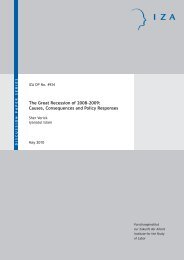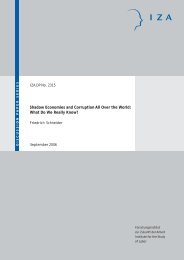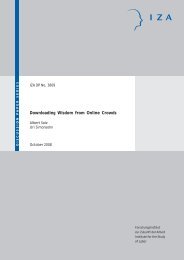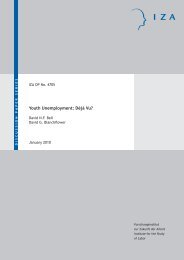Limited Self-Control, Obesity and the Loss of ... - Index of - IZA
Limited Self-Control, Obesity and the Loss of ... - Index of - IZA
Limited Self-Control, Obesity and the Loss of ... - Index of - IZA
Create successful ePaper yourself
Turn your PDF publications into a flip-book with our unique Google optimized e-Paper software.
discounting (see, e.g., Laibson 1997). A low discount factor (i.e. a discount factor decreased<br />
by β, β ∈ (0,1)) is applied between <strong>the</strong> present time <strong>and</strong> some point <strong>of</strong> time in <strong>the</strong> near future,<br />
<strong>and</strong> a constant discount factor δ <strong>the</strong>reafter. An excellent account <strong>of</strong> <strong>the</strong> recent extensive<br />
empirical <strong>and</strong> <strong>the</strong>oretical literature on time inconsistent preferences is provided in Frederick et<br />
al. (2002).<br />
With regard to obesity, <strong>the</strong> self-control issue is explicitly addressed in Cutler et al. (2003),<br />
whereby its relevance in <strong>the</strong> assessment <strong>of</strong> consumers’ welfare is discounted because it would<br />
require only some exercise on <strong>the</strong> part <strong>of</strong> overweight people to balance <strong>the</strong>ir energy<br />
household. Observed inactivity thus seems to indicate that overweight people do not suffer<br />
from <strong>the</strong>ir body mass. However, <strong>the</strong> trade-<strong>of</strong>f is calculated, assuming that people have self-<br />
control problems with eating, but not with taking physical exercise. This asymmetry does not<br />
fit our casual observations.<br />
When thinking about policy proposals, it is important to know whe<strong>the</strong>r <strong>and</strong> to what extent<br />
people face a self-control problem when tempted by <strong>the</strong> abundance <strong>of</strong> food. Is obesity rational<br />
<strong>and</strong> reflecting an appetite for food so that it can be reduced to an issue <strong>of</strong> externalities in a<br />
publicly regulated <strong>and</strong> funded health system? Or does it reflect ignorance <strong>and</strong> a lack <strong>of</strong><br />
imagination <strong>of</strong> its consequences, requiring some sort <strong>of</strong> information policy? Or must obesity<br />
be treated like smoking, where some people lack will power to control <strong>the</strong>ir behavior? The<br />
challenge for research is to disentangle <strong>the</strong> various behavioral reasons for obesity.<br />
III. Testing Strategy <strong>and</strong> Previous Evidence<br />
Based on observed behavior, it is difficult to discriminate between <strong>the</strong> view <strong>of</strong> consumers as<br />
rational actors <strong>and</strong> consumers facing self-control problems. Independent <strong>of</strong> whe<strong>the</strong>r people<br />
have a strong preference for fatty food, are ignorant <strong>of</strong> or unable to imagine <strong>the</strong> health<br />
consequences, or simply lack will power, a higher likelihood <strong>of</strong> overweight <strong>and</strong> obesity is<br />
predicted in today’s environment <strong>of</strong> food affluence.<br />
We see three approaches that shed light on <strong>the</strong> possible behavioral forces behind <strong>the</strong> obesity<br />
phenomenon. The first two approaches look for patterns <strong>of</strong> behavior that cannot easily be<br />
reconciled with st<strong>and</strong>ard utility maximization. The third approach is based on <strong>the</strong> idea <strong>of</strong><br />
separating <strong>the</strong> consumption decision from <strong>the</strong> utility <strong>the</strong>reby produced. This creates <strong>the</strong><br />
necessary degree <strong>of</strong> freedom so that revealed behavior can systematically diverge from utility<br />
maximization.<br />
6
















